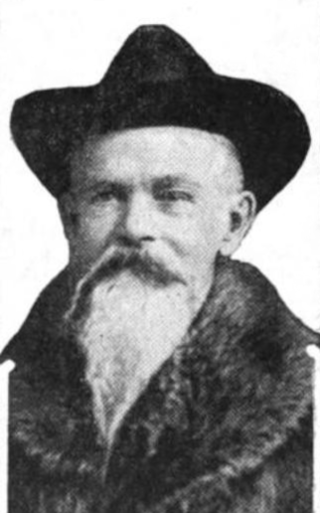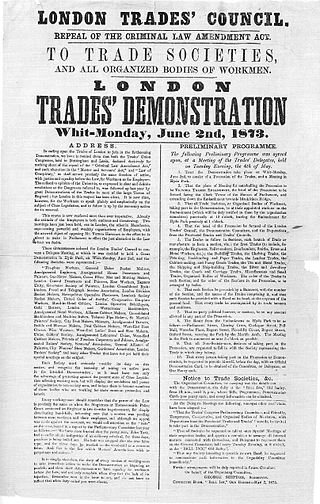
The Province of Canada was a British colony in British North America from 1841 to 1867. Its formation reflected recommendations made by John Lambton, 1st Earl of Durham, in the Report on the Affairs of British North America following the Rebellions of 1837–1838.

The Province of Upper Canada was a part of British Canada established in 1791 by the Kingdom of Great Britain, to govern the central third of the lands in British North America, formerly part of the Province of Quebec since 1763. Upper Canada included all of modern-day Southern Ontario and all those areas of Northern Ontario in the Pays d'en Haut which had formed part of New France, essentially the watersheds of the Ottawa River or Lakes Huron and Superior, excluding any lands within the watershed of Hudson Bay. The "upper" prefix in the name reflects its geographic position along the Great Lakes, mostly above the headwaters of the Saint Lawrence River, contrasted with Lower Canada to the northeast.

The Winnipeg General Strike of 1919 was one of the most famous and influential strikes in Canadian history. For six weeks, May 15 to June 26, more than 30,000 strikers brought economic activity to a standstill in Winnipeg, Manitoba, which at the time was Canada's third largest city. In the short term, the strike ended in arrests, bloodshed and defeat, but in the long run it contributed to the development of a stronger labour movement and the tradition of social democratic politics in Canada.

The Australian Council of Trade Unions (ACTU), originally the Australasian Council of Trade Unions, is the largest peak body representing workers in Australia. It is a national trade union centre of 46 affiliated unions and eight trades and labour councils. The ACTU is a member of the International Trade Union Confederation.

The Canadian Labour Congress, or CLC is a national trade union centre, the central labour body in Canada to which most Canadian labour unions are affiliated.

James "Jimmie" Simpson was a British-Canadian trade unionist, printer, journalist and left-wing politician in Toronto, Ontario. He was a longtime member of Toronto's city council and served as Mayor of Toronto in 1935, the first member of the Cooperative Commonwealth Federation to serve in that capacity. He was also a member of the Orange Order in Canada.

Elizabeth Rowley is the current leader of the Communist Party of Canada. A long-time politician, writer, and political activist, Rowley served as a school trustee in the former Toronto borough of East York. Before becoming leader of the Communist Party of Canada, Rowley was leader of the Communist Party of Ontario. She has been a member of the Central Executive of the Communist Party of Canada since 1978 and has campaigned for office many times at the municipal, federal and provincial levels. Rowley was elected the leader of the Communist Party of Canada by the party's Central Committee in January 2016, following the retirement of Miguel Figueroa. She is the first female leader of the Communist Party of Canada.
The Trades and Labor Congress of Canada was a Canada-wide central federation of trade unions from 1886 to 1956. It was founded at the initiative of the Toronto Trades and Labour Council and the Knights of Labor. It was the third attempt at a national labour federation to be formed in Canada: it succeeded the Canadian Labour Union which existed from 1873 to 1877 and the Canadian Labour Congress which held only one conference in 1881.

The Workers' Unity League (WUL) was established in January 1930 as a militant industrial union labour central closely related to the Communist Party of Canada on the instructions of the Communist International.

Daniel John O'Donoghue was a printer, labour leader and political figure in Ontario. O'Donoghue is recognized as one of the original founders of organized labour in Canada and in 1874 he became the first labour candidate election to a Canadian legislature.
Claude Jodoin was a Canadian trade unionist and politician. He served as the first president of the Canadian Labour Congress from 1956 to 1966.

The Sheffield Trades and Labour Council, usually known as the Sheffield Trades Council, is a labour organisation uniting trade unionists in Sheffield.
The Canadian Labour Union was the short-lived first attempt at a national central organization to represent labour unions in Canada. It was founded in Toronto, Ontario on September 23, 1873, by 46 local unions. It could not be called a national body as only Ontario-based unions participated. The Union was a political organization with the aim "to agitate such questions as may be for the benefit of the working classes, in order that we may obtain the enactment of such measures by the Dominion and local legislatures as will be beneficial to us, and the repeal of all oppressive laws which now exist".
The Ottawa and District Labour Council or ODLC is the central labour body for Ottawa, Ontario, Canada. Its membership is union locals of national or international unions affiliated to the Canadian Labour Congress. The Ottawa & District Labour Council is one of the oldest Canadian labour organizations tracing its inception to the Ottawa Trades Council in 1872.
Robert Hugh Carlin was a Canadian labour union organizer and politician, who represented the electoral district of Sudbury in the Legislative Assembly of Ontario from 1943 to 1948. He was a member of the Co-operative Commonwealth Federation (CCF).
This is a timeline of the history of Ottawa.

Labour Day is a statutory public holiday in Canada that occurs on the first Monday in September. It is one of several Labour Day celebrations that occur in countries around the world. The Canadian celebration of Labour Day occurs on the same day each year as Labor Day in the United States.

The cultural and legal framework within which tradesmen contracted for work, and hired men was similar to that of Great Britain. These immigrants quickly sought to establish and regulate the basic institutions of the trades: Friendly societies, the house of call and apprenticeship. Friendly societies were worker controlled mutual insurance organizations. They provided an income in the case of strike, injury or economic downturn. Their association with specific trades also made them useful vehicles for trade union organization.

The Trades Union Congress (TUC) is a national trade union centre, a federation of trade unions that collectively represent most unionised workers in England and Wales. There are 48 affiliated unions with a total of about 5.5 million members. Paul Nowak is the TUC's current General Secretary, serving from January 2023.

The London Trades Council was an early labour organisation, uniting London's trade unionists. Its modern successor organisation is the Greater London Association of Trades (Union) Councils












